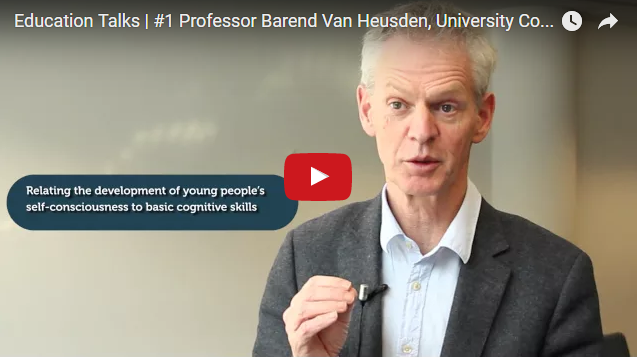Education Talks: Why cultural education matters

Transcription:
What is cultural education?
Cultural education consists of the capacity for reflection. Children and also youngsters in cultural education learn to reflect upon their own culture, culture of others and culture in general.
And this capacity for reflection is in principle trained in many different forms: it can be through journalism for instance or through history but also through the arts. I think the arts are one of the main forms of self-consciousness, cultural self-consciousness but also philosophy, science and also lessons for example in citizenship.
All these forms of reflection together form what cultural education is and that also explains immediately why it is so difficult because of course cultural self-consciousness within Europe is incredibly diverse.
Teaching this to children is very important because it helps them to grow up and to function in a culture which has not one clear identity ready for them.
One of the reasons why cultural education is not at the moment let's say more or less one linear continuous curriculum throughout primary and secondary education is because it has not been conceived as one thing for a long time. That is exactly what we want to do through this ‘Culture in the Mirror’ project. We want to demonstrate, to prove in a sense that different subjects such as history, philosophy, the arts or journalism form in fact one single whole and they should be taught as a whole.
How is it possible to relate cultural education to children's development?
Children between 5 and 7 years of age reflect upon themselves, absolutely but they do so mainly imaginatively. Of course most teachers notice intuitively because they tell them stories, they let them play and that is where the self-reflection is. But if you want to really develop a curriculum in self-reflection or cultural consciousness then you have to be aware of this and you can relate to it.
Same thing for older children, starting from the age of 8 or 9. Their self-reflection becomes more conceptual, more collective. The peer group becomes more important, etc. So I think that is the kind of knowledge that teachers should require because it helps them to develop their cultural education curriculum.
What is required to mainstream good quality cultural education across Europe's diverse school curricula?
I would say that there are 2 things which are most needed and they are of equal urgency.
The first one is simply knowledge. Because one of the striking things about cultural education is that there is an enormous lot of enthusiasm. People love to do it in general. Teachers are very committed to what they do but there is strikingly little theoretical knowledge about for example what culture is, about the developments in children that are relevant to culture. And that was one of the main goals of the ‘Culture in the Mirror’ project: to develop this knowledge, make it available for teachers and also for headteachers and policymakers.
The other thing, the second thing which is certainly as needed is insight in the specific characteristics of European culture. We have to teach children in Belgium, in Italy, in Sweden that insofar as they are part of a European culture, they are in fact universal, they are human beings in general. Which means that the specific local cultures, Swedish traditions, Hungarian traditions, etc. in a sense become more relative within this broader context.
This is also something that you have to learn. They are a little less important. They are little less important than these basic human universal values. I think this is a typical aspect of European culture which is very important to realise or to be aware of when you teach culture in a European context.
